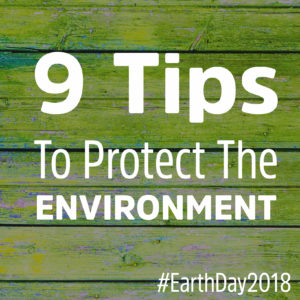Earth Day 2018

9 Tips to Help Protect the Environment
Shopping with No Risk of Dropping
Carnegie Mellon University Ph. D. Nathaniel Horner, Ph.D. at Carnegie Mellon recommends online shopping. The theory: delivery trucks bringing larger quantities to central locations produces fewer emissions than individual cars.
Bulk Up
The EPA says buying food in bulk saves on packaging and significantly lowers the number of containers in landfills. Did you know those pesky containers make up 23% of landfill contents?
Please Professors… Count Words Not Pages
According to the National Center for Education Statistics – in 2017, 50.7 million college students in the U.S. on average turned in 90 pages of material during the academic year.
If the college “norm” of document formatting switched to single–spaced and double-sided printing it would reduce paper usage by 73% or 3.3 billion sheets of paper! That’s 330,000 trees. Just think what would happen if they accepted all papers electronically.
Certify Your Dirty Dishes
Think handwashing dishes is better for the environment? Think again. Switch to an ENERGY STAR certified dishwasher and within a year you will cut the energy use in half and save 5,000 gallons of water. (energystar.gov)
Light it Up, Up, Up…
Replace your light fixtures with ENERGY STAR Certified models and cut energy usage by 25%-80%.
Split your Uber
Uber made 4 billion trips in 2017, averaging 6.4 miles per trip. This equates to 10 million metric tons of CO2. Traveling in packs can make a difference – there’s more value to selecting the ride share option than you might think
Call the Plumber
If your leaky faucet dripped every second, it would waste 2,040 gallons of water a year (water.usgs.gov). Duct tape is great, but let’s make sure
we let the experts fix our pipes!
Pump your tires people
Under-inflation increases tire wear, reduces fuel economy, and leads to higher carbon pollution emissions. Properly inflated tires can take 327 pounds off your yearly carbon footprint! (Blog.epa.gov)
Let the Machines Do It
According to a study by the International Carwash Association, a commercial car wash uses 30 gallons less water than the hose in the driveway method. And, commercial car wash operators are required to route wastewater to treatment facilities for proper filtering before being sent back into the environment.